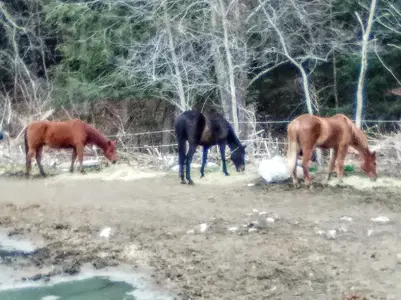Oh, and I found some more pictures.
This is what happens when people see and use animals as
a background object, no different from a "prop" around the house. This was Remi.
Remi is a thoroughbred racehorse retired from the track after winning exactly
one race in his life. Unfortunately, since racehorses are not trained to be comfortable in their own skin, and temperament is not as important a trait selected in breeding them, they develop nervous problems sometimes. I got to get to know him over there at the barn as well. (Note the other one in the background--standing still for once.) He's very physically fit and should probably live to about 30 years of age.
Remi was incredibly gentle but picked up a very bad habit of cribbing, so he will have to wear a cribbing collar for what years he's got left. I had him turn his head for this picture so it wouldn't show, as it looks ridiculous on him--but not quite as ridiculous as all the mangers, fences, and barn doors he ruins on a regular basis. Cribbing= hooking his teeth into the top rail of a fence or the door of his stall and pulling as hard as he can. It is an equine version of a self-stimulating behavior. Stimming is visible enough when it's Steve in Accounting clicking a ball-point pen; when it's a 1200-pound horse biting chunks out of 2x6 planks it gets old quickly. He can't be trained out of it.
Sure, he lives a pretty decent life. He's quite fortunate because many retired racehorses are put on stock trucks, shipped to Canada or Mexico without food or water, and slaughtered--still, it'd be nice if he didn't have to have a piece of cast aluminum buckled under his chin 24 hours a day to keep him from eating the furniture. He's happy when he's at work with his rider or socializing with the other horses.
Treating animals as things for profit is going to have negative results for the people and the animal. Just because he was a lousy racehorse didn't mean he'd be sub-par at anything else; I asked his owner and she said he was
fast enough (which is correct) and he's excelled in other disciplines. The sunk-cost fallacy of trying to make him into something he just didn't seem to
want to be good at wasted time and money for the owner and gave him either a silly-looking "cribbing collar" or a very bad habit of eating boards.
They're not props, tools, or investments--they are just plain animals, and that's good.
